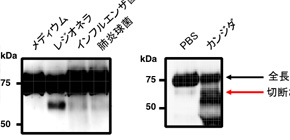
Discovery of a new biological defense system to eliminate microbial pathogens
Will contribute to the prevention of and development of drugs for infectious diseases
A group of researchers led by Assistant Professor HIRAYASU Kouyuki and Professor ARASE Hisashi (Immunology Frontier Research Center/Research Institute for Microbial Diseases, Osaka University) discovered human receptors which detect the invasion of microbial pathogens and ascertained that they worked as a biological defense system, a world first.
Microbial pathogens fight back against the host’s biological defense system by making a variety of proteins. As one of their molecular mechanisms, it is known that microbial protease cleaves host antibodies. If antibodies are cleaved, the host cannot get rid of microbial pathogens. However, countermeasures taken by the host against such microbial immune evasion mechanisms were not well understood.
In this study, it was found that receptors which recognize cleaved antibodies were in hosts, and that they fought against microbial immune evasion mechanisms. In order to find how immune cells recognize microbial pathogens and how they are involved in biological defense, this group examined human cell strains infected with Mycoplasma as a microbial pathogen-infected model and found that immunologically activated receptor LILRA2, whose function had not been known, recognized cells infected with Mycoplasma. Furthermore, this group examined molecules recognized by LILRA2 on Mycoplasma-infected cells and found that LILRA2 recognized antibodies that were cleaved by protease produced by Mycoplasma.
In addition to Mycoplasma, Legionella, pneumococcus, hemophilus influenza, and candida also produced protease and cleaved antibodies. Legionella infect immune cells and multiply in cells. It was found that when LILRA2 expressed on immune cells recognized cleaved antibodies, the proliferation of Legionella bacteria in cells was prevented. Furthermore, it was found that in tympanitis, inflammatory atheroma, cellulitis, and other places infected with bacteria, antibodies were cleaved by protease, activating LILRA2-expressing cells.
In this way, this group discovered that LILRA2 recognized antibodies cleaved by microbial pathogens, serving as a biological defense system, a world-first. In other words, it is thought that immune evasion mechanisms in which microbial pathogens cleave antibodies are captured by the host’s biological defense system via LILRA2. Controlling LILRA2 through this group’s achievement will contribute to the development of treatment and prevention methods of infectious diseases.
Abstract
Microbial proteases degrade a variety of host proteins. However, it has remained largely unknown why microbes have evolved to acquire such proteases and how the host responds to microbially degraded products. Here, we have found that immunoglobulins disrupted by microbial pathogens are specifically detected by leukocyte immunoglobulin-like receptor A2 (LILRA2), an orphan activating receptor expressed on human myeloid cells. Proteases from Mycoplasma hyorhinis, Legionella pneumophila, Streptococcus pneumonia and Candida albicans cleaved the N-terminus of immunoglobulins. Identification of the immunoglobulin-cleaving protease from L. pneumophila revealed that the protease is conserved across some bacteria including Vibrio spp. and Pseudomonas aeruginosa. These microbially cleaved immunoglobulins but not normal immunoglobulins stimulated human neutrophils via LILRA2. In addition, stimulation of primary monocytes via LILRA2 inhibited the growth of L. pneumophila. When mice were infected with L. pneumophila, immunoglobulins were cleaved and recognized by LILRA2. More importantly, cleaved immunoglobulins were detected in patients with bacterial infections and stimulated LILRA2-expressing cells. Our findings demonstrate that LILRA2 is a type of innate immune receptor in the host immune system that detects immunoglobulin abnormalities caused by microbial pathogens.

New concept for host defense system against microbial pathogen
Antibodies play an important role in host defense against microbial pathogens. However, microbial pathogens seem to have acquired a protease that destroys antibodies in order to evade host immune system. On the other hand, the host immune system appears to have acquired an immune activating receptor, LILRA2, that specifically recognizes microbially cleaved antibodies.
To learn more about this research, please view the full research report entitled " Microbially cleaved immunoglobulins are sensed by the innate immune receptor LILRA2 " at this page of the Nature website.
Related link
